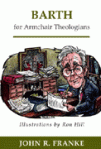
Franke, John R. Barth for Armchair Theologians. Louisville: John Knox, 2006. xi+183
Interest in the theology of Karl Barth remains at a near fever pitch. For those preparing for a career in theology, staring at the tombs of the Church Dogmatics can be overwhelming. As a former professor of mine once said, there is no substitute for reading the man himself. While there is certainly wisdom in that remark, introductions to his thought can be a welcome aid to the daunting volume of Barth’s work. In this short work, John Franke attempts to provide a helpful introduction to this great theologian.
To help the novice, Franke combines both historical and theological developments. The bulk of the book centers on Barth’s life and theological pilgrimage, but at key points Franke detours to explain the significance of a time, place, or writing for Barth’s emerging thought. This has the effect of helping the reader reach the chapter on the Church Dogmatics, the point all of Franke’s earlier writing is moving towards, with a decent sense of how Barth arrived at the convictions he did at the Church Dogmatics, and why they matter so much to him.
The centerpiece of this book is a chapter devoted to Barth’s crowning achievement, the Church Dogmatics. Before summarizing the contents of each volume, he sets some broader contours of the work. Franke briefly overviews Barth view of faith & reason, the shape & structure of the CD, and how to go about reading this enormous and complex work. Regarding strategies for comprehension he summarizes the six “patterns” found in Barth’s work as understood by George Hunsinger. This is a helpful inclusion as it gives the new reader of the CD a set of broader lens through which to begin to understand Barth. For someone like myself who has been exposed to Barth numerous times but is not an expert, these six categories helped to clarify for me what I find compelling about Barth & what I don’t. While the summaries of each volume are well done, I benefitted most from context-setting work Franke does.
The book concludes with an evaluation of Barth’s legacy. It is at this stage that the debate surrounding McCormack’s project is discussed. Up to this last chapter Franke’s opinion regarding how to best read Barth (turn to analogy vs. McCormack’s reading) had remained relatively well hidden from view, but at this juncture McCormack’s reading gets Franke’s stamp of approval. Both traditional and postmodern interpreters of Barth will be dissappointed with Franke’s sympathies with McCormack’s views, although Franke is charitable in his evaluations. Furthermore, this chapter is invaluable for the book regardless of this inner squabble since the real prize of the chapter is how Franke demonstrates the importance of Barth’s thought for the future of theology, something all parties can agree on.
Franke has offered an accessible and entertaining introduction to both the life and thought of Barth. Franke’s work creates a level of desire to engage Barth himself, which should be the goal of any primer of a major theologian. He helps the reader see why Barth matters, for both yesterday and tomorrow, and provides tools to begin the exploration. As someone who would consider myself somewhere between a beginner and an expert, I profitted from reading this work, and highly recommend it to anyone interested in Karl Barth.
No comments:
Post a Comment